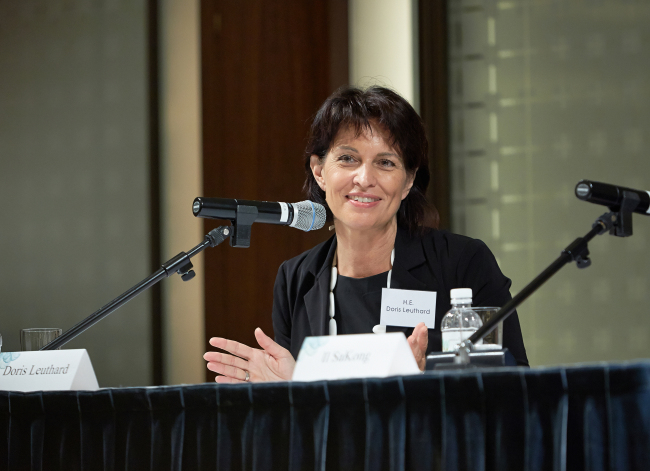‘Switzerland is smart partner for sustainable future’
By Korea HeraldPublished : July 12, 2015 - 19:29
Switzerland and Korea can join hands to reduce the world’s carbon footprint and push sustainable use of energy, the Swiss environment minister highlighted last week.
Switzerland’s minister of the environment, transport, energy and communications (DETEC), Doris Leuthard, came to Korea on a four-day visit to share her country’s sustainable policies and innovations, supported by the Institute for Global Economics, the Swiss Embassy in Seoul and the Swiss-Korean Business Council.
The minister was accompanied by a delegation of Switzerland’s clean-tech industry and scientific community representatives. She met her counterparts in the Korean ministries, as well as company heads in the solar cell, hydrogen engine and energy storage sectors.
The 53-year-old minister is one of seven members of the Federal Council ― Switzerland’s executive cabinet ― which serves as a collective head of government and state. DETEC is a federal ministry in charge of sustainable development, with policies and actions covering the environment, transport, energy, communications and spatial development.
Switzerland’s minister of the environment, transport, energy and communications (DETEC), Doris Leuthard, came to Korea on a four-day visit to share her country’s sustainable policies and innovations, supported by the Institute for Global Economics, the Swiss Embassy in Seoul and the Swiss-Korean Business Council.
The minister was accompanied by a delegation of Switzerland’s clean-tech industry and scientific community representatives. She met her counterparts in the Korean ministries, as well as company heads in the solar cell, hydrogen engine and energy storage sectors.
The 53-year-old minister is one of seven members of the Federal Council ― Switzerland’s executive cabinet ― which serves as a collective head of government and state. DETEC is a federal ministry in charge of sustainable development, with policies and actions covering the environment, transport, energy, communications and spatial development.

“It is my pleasure to share with you our innovations, which drive our growth, green technology and quality of life,” Leuthard said at a seminar labeled “Global energy and environmental issues and Switzerland” at the Westin Chosun Hotel on Thursday. “Korea, like Switzerland, has a high-tech and innovation-driven economy, and we have fruitful cooperation.”
Korea is one of Switzerland’s seven non-European priority countries for research, education and technology cooperation. The Korean-Swiss Science and Technology Program supported 37 joint research projects through 2012.
Located at the heart of Europe, Switzerland has relied on its modern transport, communications infrastructure and electricity network for its tightknit democracy, community and commerce.
As Switzerland has few natural resources and imports 80 percent of its energy, an efficient use of its resources has been important to the people and business, the minister noted. The high cost of electricity has led public, commercial and research institutions to develop efficient technologies.
The Fukushima nuclear disaster, with its irreparable environmental, economic and emotional damage, has served as a crude wakeup call to phase out nuclear power. The first plant will shut down in 2019 amid the country’s transition to renewable power sources, mainly hydropower.
Switzerland’s five nuclear plants currently generate some 38 percent of its electricity, while 56 percent comes from hydropower, 4 percent from other renewables and 2 percent from fossil fuels.
Noting that global energy demand will rise 60 percent by 2035, Leuthard said, “The ability to offer energy at affordable prices is a decisive factor for a modern economy.”
She added, “That is why improving energy efficiency, expanding renewable energy and advancing energy security are on the global agenda of governments.”

According to the International Energy Agency, 20 percent of the world’s population consumes 80 percent of global energy and the 1.3 billion people in the most industrialized countries use 35 times more electricity than the 2.2 billion people in the least industrialized nations.
In Asia, private automobile ownership has risen sharply, and the number of cars in the world is estimated to reach 1.8 billion by 2035.
“Therefore, it is critical to take steps to reduce (our) carbon footprint in transport, buildings, cooling and heating systems,” Leuthard stressed. “This is where the greatest potential lies in reducing energy consumption and boosting efficiency.”
To reduce the ecological footprint, Leuthard stressed incorporating information and communications technologies into the energy production, transmission and consumption at all levels.
“When our German neighbors speak of ‘Industry 4.0,’ they are referring to the advanced form of business based on ICT,” the minister highlighted. “I believe we should go a step further and develop an ‘Infrastructure 4.0’ strategy.”
According to the minister, information and communications technology can be embedded in “every part” of the “smart networks” ― from electricity meters in the home to turbines at power stations. Doing so would modernize the infrastructure and economize utility.
Leuthard underscored that reducing greenhouse gas emissions is in the interest of both emerging and developing countries.
“All countries must do their part to reduce emissions and assume their share of responsibility,” she stressed. “Each country’s measure will be different based on the energy and power mix.”
Switzerland is pursuing policies to cut down greenhouse gas use by adhering to the 2010 Cancun Agreement, where controlling global warming to 2 degrees Celsius above preindustrial levels was agreed upon as part of the United Nations Framework Convention on Climate Change.
The minister lauded Korea for its $100 million contribution to the Green Climate Fund (same as Switzerland), as well as hosting the institution in the Songdo district of Incheon.
She also praised Korea for launching the Emission Trading System this year ― a market-based approach for controlling pollution through incentives ― as Asia’s first country to adopt such a system on a nationwide scale.
By Joel Lee (joel@heraldcorp.com)
-
Articles by Korea Herald








![[Weekender] Geeks have never been so chic in Korea](http://res.heraldm.com/phpwas/restmb_idxmake.php?idx=644&simg=/content/image/2024/05/16/20240516050845_0.jpg&u=)









![[Herald Interview] Byun Yo-han's 'unlikable' character is result of calculated acting](http://res.heraldm.com/phpwas/restmb_idxmake.php?idx=652&simg=/content/image/2024/05/16/20240516050855_0.jpg&u=)
